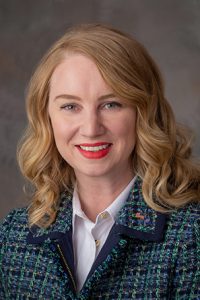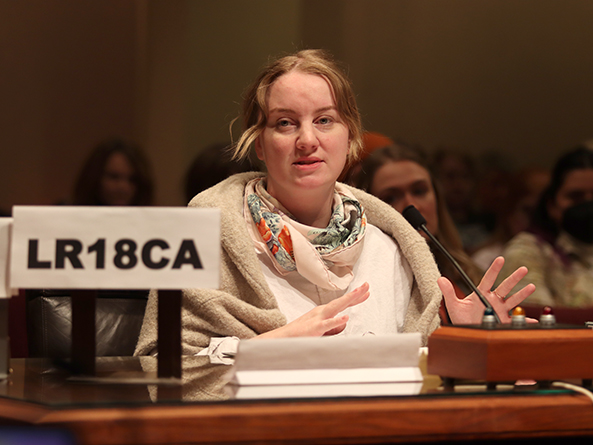Constitutional amendments would protect reproductive freedom
The question of reproductive rights in Nebraska would be put directly to voters under a pair of constitutional amendments heard by the Health and Human Services Committee March 16.

The amendments, introduced by Omaha Sen. Megan Hunt, would be placed on the November 2024 general election ballot if passed by the Legislature.
LR18CA would amend the state constitution to include “reproductive freedom” as an inherent and inalienable right along with life, liberty, the pursuit of happiness and the right to keep and bear arms.
LR19CA would create a new section of Nebraska’s constitution to outline reproductive rights, including the right to make decisions about all matters relating to pregnancy and abortion, and would protect Nebraskans from legal penalties related to any pregnancy outcome.
Hunt said it is time to put decisions regarding reproductive freedom in the hands of Nebraskans, not lawmakers. The U.S. Supreme Court delegated authority over abortion regulation to the states, she said, and Nebraska voters should be the ultimate decision makers.
“[Lawmakers] really don’t know what’s best for individuals and their families when it comes to decisions about how, when [and] where to start a family,” Hunt said. “But I trust our neighbors and I want to know what they think.”
Erin Feichtinger, policy director for the Women’s Fund of Omaha, testified in support of both amendments. Since the U.S. Supreme Court overturned Roe v. Wade, she said, every state that placed abortion rights on the ballot has voted to affirm those rights.
“Nebraskans are asking for the same opportunity to truly let their voices be heard on the issue,” Feichtinger said. “We should not be afraid to let the voters decide.”
Also speaking in support of the proposals was Lisa Lewis from the civil right committee of the Jewish Federation of Omaha. She said any restriction on reproductive rights is a restriction on people’s religious freedoms.
“In Judaism, life is precious [and] a woman’s life always takes precedence over everything,” Lewis said. “There should not be an imposition of law against your particular faith belief.”
Kelsey Arends, staff attorney at Nebraska Appleseed, also spoke in support of LR18CA and LR19CA. Restrictions on abortion care disproportionately harm communities of color, she said, and enshrining a right to reproductive freedom in the state constitution would address elements of racial injustice in the health care system.
“Black and Indigenous people are two to four times as likely as white people to die during pregnancy or around the time of childbirth,” Arends said. “Recent estimates indicate that a nationwide abortion ban would increase maternal mortality by 21 percent overall and by 33 percent for Black Americans.”
Testifying on behalf of the Nebraska Family Alliance in opposition to both proposals was Nate Grasz. He said abortion takes away the most important and fundamental right for a human being — the right to life.
“We possess this right by virtue of our humanity and not because it is granted to us by [the] government or other people,” Grasz said. “States should seek to provide greater protections to the lives of baby boys and girls in our state while providing meaningful, compassionate care and support for mothers and their families.”
Executive Director of Nebraska Right to Life Sandy Danek also testified in opposition, saying a person can be held criminally liable under state and federal law for injuring or killing an unborn child while committing a crime against a pregnant individual because they are recognized as two separate human lives.
“Clearly, both our federal and state legislative bodies have endowed the unborn child at any stage of development with personhood,” Danek said. “Therefore, that child is also entitled to the right to life — which [is] in direct conflict with reproductive freedom.”
Also speaking in opposition to LR18CA and LR19CA was Justine Kyker, who said both measures misconstrue the definition of reproductive freedom.
“The right to reproductive freedom is our right to reproduce,” she said, “not our right to abort.”
The committee took no immediate action on either proposal.


